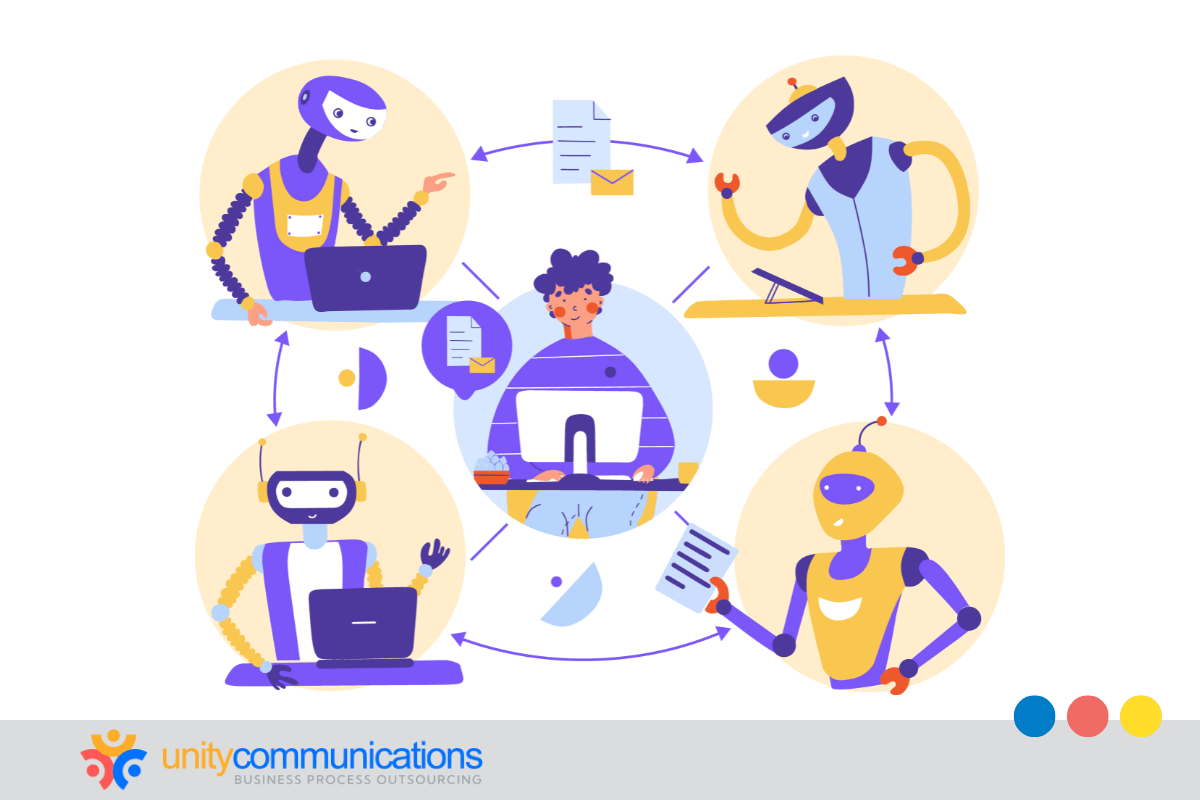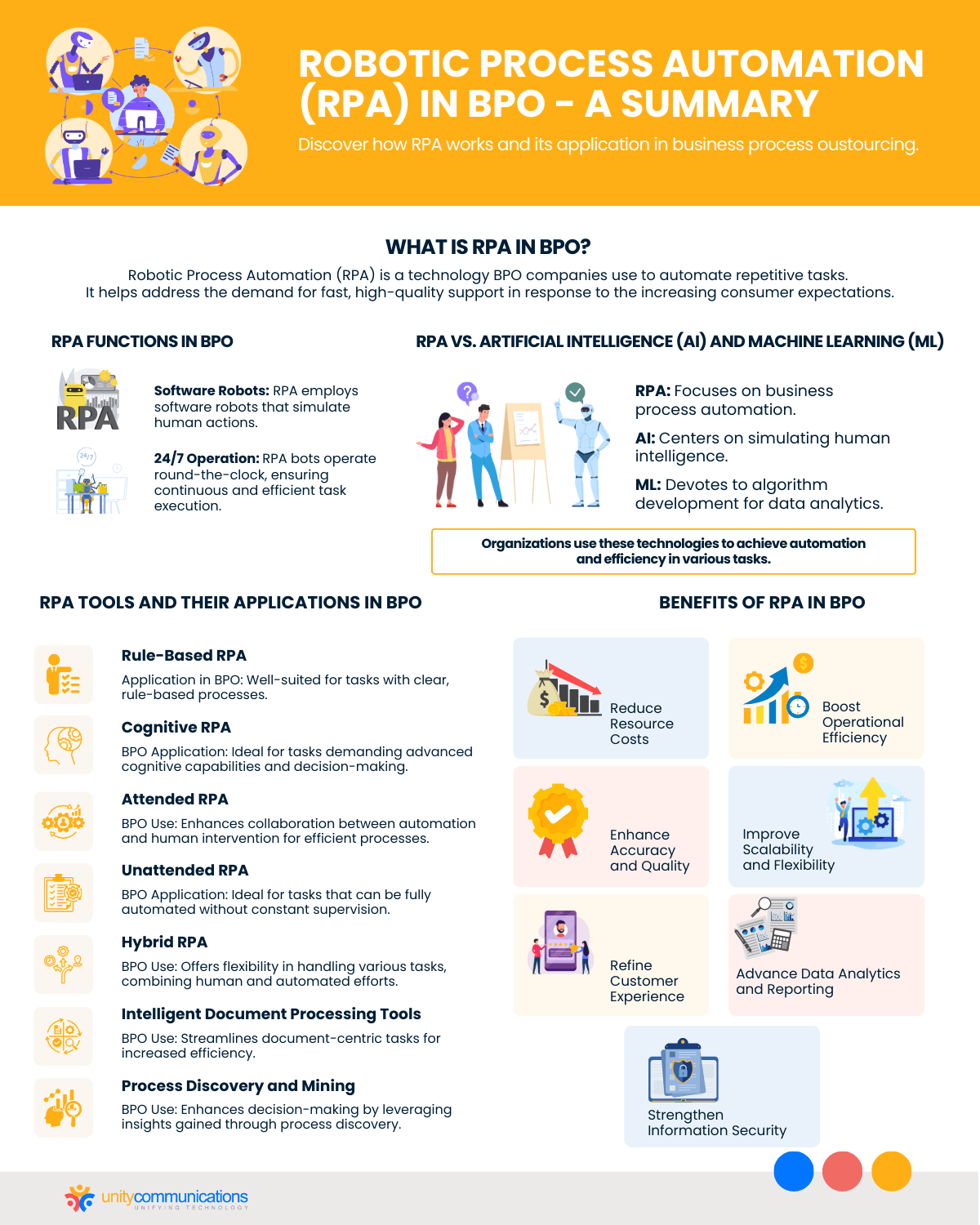Table of Contents
Fiction readers and fans might think of robot domination when they hear “robotic process automation (RPA).” Fortunately, experts did not develop RPA to take over the world.
This technology does not involve physical machines. It simply serves as a digital workforce to boost productivity and cost efficiency.
RPA also helps revolutionize the business process outsourcing (BPO) industry. Do you want to know how?
Get your iced coffee and buckle up as we detail RPA’s role in the outsourcing market’s growth.
Digging into Robotic Process Automation for BPO
Do you ever wonder what BPO is and why it is in high demand? Have you considered what technology service providers use to speed up repetitive tasks?
Yes, that technology is robotic process automation. This advanced solution helps vendors automate processes to meet the increasing demand for fast, high-quality support.
In customer service alone, consumers demand quick and round-the-clock support. According to Emplifi, buyers tag slow response time as the primary driver of a negative experience. Hence, businesses need solutions such as RPA to speed up service delivery.
RPA uses software robots that simulate human actions to perform tedious, non-core tasks. These RPA bots interact with various systems, application programming interfaces (APIs), and software solutions as much as people do—except that RPA can operate 24/7 and accomplish the following BPO processes faster and more accurately:
- Data entry and validation
- Invoice and billing processing
- Report generation
- Financial services
- Order and inventory management
- Consumer support
- Data migration and organization
- System scanning and updating
- Data collection and analysis
- Identity verification
- Threat detection and mitigation
RPA vs. Artificial Intelligence (AI) and Machine Learning (ML)
However, note that robotic process automation is related to but distinct from AI and ML technologies. RPA focuses on business process automation, AI on human intelligence simulation, and ML on algorithm development for data analytics.
These technologies work together to help BPO companies enhance their daily operations. Organizations unite on such platforms to accomplish the following:
- Automate processes such as chat, email, and call responses
- Understand, extract, and interpret unstructured data
- Identify patterns in customers’ buying behavior, preferences, and demands
- Analyze data on market trends
- Support rapid reporting and decision-making
Different RPA Tools and Their BPO Applications

Robotic process automation offers various tools to assist service providers in streamlining their day-to-day functions. Although these technologies cater to similar automation needs, they still differ regarding specific applications:
- Rule-based RPA follows predefined instructions to execute tasks accurately.
- Cognitive RPA needs AI and ML for knowledge-based activities such as data analysis.
- Attended RPA supports human workers in accomplishing their duties in real time.
- Unattended RPA operates automatically without human intervention.
- Hybrid RPA combines attended and unattended automation solutions.
- Intelligent document processing tools automate document-focused processes.
- Process discovery and mining facilitate a data-driven approach to automation.
With these tools, BPO has evolved, and companies that outsource enjoy countless benefits.
Uncovering RPA’s Contribution to BPO Transformation
Due to its capability to accelerate repetitive tasks, robotic process automation has become popular across different industries, especially BPO. Service providers optimize the technology to enable employees to devote more time and attention to high-value projects.
Such an advantage helps BPO firms stay competitive in the fast-paced market. Let us explore more details about the benefits of RPA in the outsourcing sector.
Reduce Resource Costs
Many BPO organizations adopt RPA to reduce their resource costs. According to Deloitte’s 2022 report, cutting expenses remains a top priority for many enterprises, and automation helps them achieve that. The company found that businesses using the technology gained an average cost reduction of 32% in 2021, up from 24% in 2020.
Because RPA makes processing times faster, service vendors only need to hire a few full-time workers to do simple tasks such as data encoding and transcription. This solution also removes the need for physical equipment as it is software-based. Moreover, RPA minimizes costly errors in data output.
Boost Operational Efficiency
RPA boosts operational efficiency for BPO providers by handling tasks that hinder human workers from focusing on their primary jobs. Kofax states that business units’ capacity to complete work increases by 35% to 50% as long as they correctly configure RPA software. Kofax added that RPA shortens the data processing period by 30% to 50%.
Enhance Accuracy and Quality
ML algorithms and statistical models enable RPA to enhance accuracy and quality when fulfilling repetitive tasks. These solutions study and draw inferences from data patterns, letting RPA apply those insights to real-time calculations.
Entrusting tedious functions to RPA lets third-party teams prioritize resolving complex issues. BPO providers have sufficient time to identify and develop strategic plans to further improve their services.
Improve Scalability and Flexibility
Service providers use RPA to improve scalability and flexibility. Software bots can manage voluminous workloads, eliminating the need for additional hiring and training, especially during hectic periods. Besides, RPA allows easy adjustments to accommodate market demand fluctuations and changing business requirements.
Refine Customer Experience
RPA’s ability to speed up responses to inquiries enhances customer experience. RPA-powered chatbots, email ticketing systems, and interactive voice response (IVR) solutions assist providers in delivering faster and more reliable consumer support.
The technology also helps provide personalized interactions. RPA’s features can retrieve and analyze data to deliver replies and resolutions based on consumers’ preferences and needs, resulting in improved customer satisfaction and retention.
Advance Data Analytics and Reporting
Deploying thousands of RPA bots advances data analytics and reporting for BPO vendors. While automating tasks, the technology can collect and generate valuable data to guide BPO workers in finding the best solution for specific problems.
Aggregating and analyzing data gives vendors valuable business intelligence to understand trends and make data-driven decisions. They then use such insights to drive continuous process improvements.
Strengthen Information Security
Service providers in the BPO sector optimize RPA to reduce human error-related data security vulnerabilities. In Verizon’s 2022 Data Breaches Investigations Report, a human element causes 82% of data breaches. These incidents include database misconfigurations and mistakes.
Fortunately, RPA mitigates human error risks related to manual data input and processing. Proper RPA configuration ensures the accurate and consistent management of sensitive data. It reduces the likelihood of data breaches resulting from human errors.
Exposing RPA Risks to BPO Providers

While robotic process automation (RPA) delivers numerous advantages to BPO vendors, knowing its related challenges is vital. This knowledge allows them to understand specific issues and take appropriate actions to resolve them.
Here are some risks that service providers face when using RPA:
- Although RPA lessens human error, it weakens data protection if not properly set up.
- The lack of RPA control and standardized processes leads to quality inconsistencies.
- Too much dependency on RPA introduces human resources and workforce skill gaps.
- Compatibility issues between RPA and backend systems disrupt automation processes.
- Overreliance on RPA without proper contingency plans creates a single point of failure.
Disclosing RPA’s Impact on BPO Clients
Robotic process automation (RPA) is useful not only for service providers but also for BPO customers. Client organizations experience faster turnaround times and reduced cycle times, improving daily productivity and scalability.
Because RPA enables BPO vendors to decrease labor and infrastructure costs, they can offer affordable service fees to businesses. Aside from improved efficiency and savings, below are other advantages that clients receive:
- Enhanced output accuracy and quality
- Reduced workloads and backlogs
- Business development prioritization
- Accelerated data-driven decision-making
- Comprehensive task reporting and analytics
- Streamlined customer service delivery
- Improved risk mitigation and security compliance
- Quick threat detection and resolution
Peeking at the Future of RPA in BPO
Due to robotic process automation’s (RPA) positive impacts, its global market size reached $2.3 billion in 2022. Grand View Research expects the sector to expand at a compound annual growth rate (CAGR) of nearly 40% from 2023 to 2030.
As many BPO firms focus on digital transformation efforts, RPA adoption is projected to grow with more advanced applications. Service providers will rapidly evolve their RPA-based processes using automation software with embedded hyperautomation capabilities.
Aside from covering repetitive tasks, hyperautomation tackles complex decision-making processes. This capability allows BPO providers to adopt a holistic approach, enabling software bots to handle complicated activities and make informed decisions.
RPA will also continue to help vendors augment their human workers’ skills. Vendors will implement the concept of a digital workforce where humans and RPA robots work closely together. This cooperation enables service vendors to achieve cost efficiency and superior service quality.
The Bottom Line

Robotic process automation has emerged as a game-changer for BPO firms, enabling them to automate labor-intensive processes and prioritize revenue-generating initiatives. Using different RPA tools helps providers boost daily operations without overspending.
Moreover, this technology increases providers’ output quality and productivity, allowing employees more time to focus on value-added tasks. Such benefits also apply to client organizations.
However, RPA-associated risks remain when service vendors do not configure their automation software accordingly. Excessively depending on RPA also hurts workforce capabilities, weakens data security, and lowers service quality. However, looking at RPA’s future helps companies identify how to jointly optimize human employees and software bots.
Do you want to learn more about how RPA applies to BPO in reality? Let’s connect; Unity Communications has valuable insights to share as it uses technology to deliver fast and accurate services. You can also discuss options to start a cost-effective BPO partnership.




